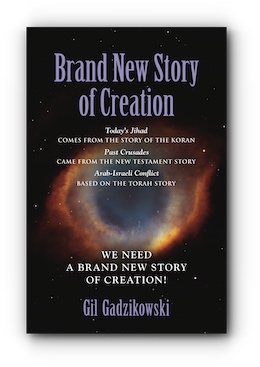| ||||||||||||||||
| Category: Social Science:Forklore And Mythology |
(requires Adobe Reader)
|
| About the Book | |
|
Brand New Story of Creation is the journey of an independent scholar, trained as a Jesuit and seasoned by top-tier executive business challenges. He takes on the avocation of answering the question: What am I doing on a ball spinning in space? The author finds no solace in the formal proofs of God. He observes that no one finds God at the end of a syllogism. Instead he observes that people seem to bring God down into their lives whenever a good deed is performed either by or to them. Spontaneously people seem to respond to a good deed: "God bless you." By doing good deeds to another we seem to bring good/God into the world. The author suggests that we intuit God in our world. Out of his retirement, he brings together a life-long deliberative assessment of the meaning of our lives as seen through the prism of our multiple religions capacity to meet the challenge of unifying the world. His assessment is as was Joseph Campbell's before him: We need a new world-unifying myth. Audaciously he describes a new story of creation. From the deliberate construction of the myth, the author elaborates the ideals and values for a unified world community. Specifically, a personal ethic for each individual is culled from the myth, called Person-Sited Theocracy. To illustrate, Person-Sited Theocracy is described against the foil of today's known state theocracies. Further, the simplicity of ethical conduct in the performance of good works is contrast against the theologically-laden and dogma-focused inhibiting practices of present day religions. Simplicity is stressed in the ethic of Person-Sited Theocracy by way of attention to and use of common sense axioms. The Golden Rule ala Confucius alongside the example of the Good Samaritan are presented as a simple base for a triage-model of ethical behavior. The model consists in 1- awareness of others, 2- response to immediate needs, and 3- provision for long-term healing. The ethic of Person-Sited Theocracy is held out for adoption and practice among all peoples. The author offers a salient distinction between the civil and moral spheres that is widely salient to the present day issues. Further application of the Brand New Story of Creation is to provide a foundation to the world-wide Social Justice discussion. The odds of world-wide application of the Brand New Story of Creation are outlined by way of an application of Joseph Schumpeter's invention-commercialization-decline model of product-life. The author draws attention to the present-day status of inventive-technology in world-wide travel and communication devices. Coupled with a review of the demographics of future generations and their exposure to the world by way of expansive technology and universal travel, the author projects adoption within two-to-three more generations. Finally, the author brings us all back to sober reality. Every myth, every story, every religion, every ethic is an hypothesis. No one was present to the "Big Bang." The real test of any myth's and story's and religion's hypothesis is what happens at death. The ultimate test of any religion or ethical hypothesis is death! We, each, can hope to be comfortable and at peace with the hypothesis we choose.
|
|
| Reviews | |
Gil's humility only underscores the tremendous thought, knowledge and experience on which this proposal is based. His personal stories engage the reader while synthesizing and challenging long held views. After reading this book, I approach my beliefs, my fellow humans, and nature with greater wonder and reverence. An ex-Jesuit traces his life-long "intuitive" quest for a unique myth and religious practice that preserves faith in God while leaving many triumphalist aspects of religion aside. A distinction between moral and civil considerations provides practical application of this gentle and loving philosophy.
|
|
| Related Title | |
|
|
| About the Author | |
 |
Gil Gadzikowski, former Jesuit seasoned by top-tier business experience, is an independent scholar. A life-long quest for meaning finds him alongside Joseph Campbell: We need a new world myth. From his retirement, Gil offers a creation story, like myths before, a foundation for a peaceful world. |

